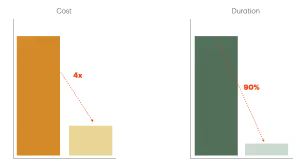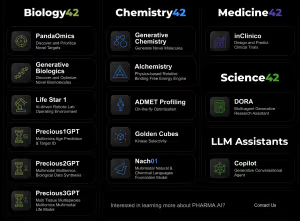The TechBio Revolution How Insilico Medicine is Leading the Charge
The TechBio Revolution How Insilico Medicine is Leading the Charge
.png)
A New Paradigm in Drug Discovery
The convergence of advanced technology and biological sciences has catalyzed what industry experts now call the "TechBio revolution." Unlike traditional biotechnology approaches, TechBio companies leverage artificial intelligence, machine learning, automation, and computational biology to fundamentally transform the drug discovery and development process. This paradigm shift promises to address the pharmaceutical industry's most persistent challenges (see image 1): high failure rates (way above 90%), extended development timelines (up to 12y, excluding the decades of academic research , and escalating costs (up to $6bn / drug).

Image 1: TechBios promise to decrease the cost of Drug R&D by up 4x and reduce its duration by up to 90% At the forefront of this revolution, several pioneering companies have established end-to-end platforms that integrate AI-driven target discovery, molecule design, and clinical development. These vertically integrated approaches aim to compress the traditional decade-long drug development cycle into mere years, or in some remarkable cases, months. The implications for patients awaiting novel therapeutics are profound, as is the potential disruption to established pharmaceutical business models. TechBio companies are organizations that began as software-first ventures, leveraging AI as the foundation of their drug discovery and development processes. Unlike traditional BioTech firms that adopt AI as an auxiliary tool, these companies embed machine learning and computational modeling into every stage of R&D, optimizing each decision before a single experiment is conducted in the lab. Their ability to generate, test, and refine hypotheses in silico accelerates development timelines and reduces costs in ways that were previously unattainable. Over time, we will analyze some of the most intriguing companies from this list of ca. 90 TechBio players, highlighting their unique approaches and impact on drug discovery. But for now, let’s start with one of the most remarkable examples: Insilico Medicine. Insilico Medicine has emerged as a particularly compelling case study in TechBio excellence. Under the leadership of Alex Zhavoronkov, the company has demonstrated that AI-driven approaches can deliver not just theoretical constructs but actual development candidates advancing through clinical trials.
Insilico Medicine's Extraordinary Achievement Metrics
Insilico Medicine has demonstrated that AI-driven approaches can deliver not just theoretical constructs but actual development candidates advancing through clinical trials. Some of their key achievements include: MetricInsilico Medicine PerformanceIndustry Standard Developmental candidates nominated (2021-2024) 22 5-10 Average time to development candidate (DC) 12-18 months 3-5 years Molecules synthesized per target 60-200 1000 Record achievement (QPCTL* program) 9 months to Phase I 5+ years *QPCTL Program refers to Glutaminyl-peptide cyclotransferase-like protein, which is an enzyme involved in various cellular processes, including immune regulation. In the context of Insilico Medicine’s QPCTL program, it represents a specific AI-driven drug discovery effort where they identified and developed a QPCTL inhibitor that reached Phase I clinical trials in just 9 months—a significantly accelerated timeline compared to traditional drug development, which typically takes 5+ years for this stage. These figures represent more than incremental improvements—they signify a fundamental reimagining of the drug discovery process.
Insilico Medicine’s AI-Driven Robotics Lab and INS018_055
A notable example of Insilico Medicine’s impact is their recent breakthrough with INS018_055, a pharmacological TNIK inhibitor designed as a senomorphic agent targeting cellular aging. Using their AI-powered robotics laboratory, Insilico integrated high-throughput automation with machine learning to develop INS018_055, demonstrating:
- AI-driven target identification: PandaOmics identified TNIK as a novel senescence modulator.
- Automated molecular design: Chemistry42 generated potential inhibitors, reducing synthesis bottlenecks.
- High-content screening: The robotics lab conducted iterative phenotypic screening at an unprecedented scale.
- Real-time data-driven optimization: InClinico simulated clinical efficacy and toxicity risks before in vivo testing.
Their AI-powered laboratory helped validate INS018_055’s senomorphic activity, demonstrating its ability to reduce senescence-associated secretory phenotype (SASP) factors while preserving cell viability1. This dual-purpose drug not only addresses age-related diseases but also has broad potential across fibrotic and inflammatory conditions.
Technology Infrastructure: The Three Pillars of Success
Insilico's competitive advantage stems from their integrated AI platform comprising three core technologies: PandaOmics functions as their target discovery engine, analyzing vast multi-omics datasets to identify novel disease targets with unprecedented speed. The system integrates genomic, transcriptomic, proteomic, and literature data to predict promising intervention points that may have eluded traditional research methods. Chemistry42 represents their generative chemistry platform, designing novel molecules with specific properties tailored to designated targets. This approach significantly reduces the chemical space exploration time while maintaining druglike properties and synthetic feasibility. InClinico leverages real-world evidence and predictive analytics to optimize clinical trial design and patient selection. This enhances success probability in later development stages—addressing the notorious "valley of death" where many promising candidates traditionally fail.

Insilico medicine “Pharma.ai” suite of software - source https://pharma.ai/
Strategic Partnership Ecosystem
Rather than positioning themselves as disruptors working in isolation, Insilico has strategically formed collaborations with established pharmaceutical companies:
- Fosun Pharma (co-development of QPCTL inhibitor) 2
- Sanofi (strategic research collaboration announced in 2022) 3
- Pfizer (AI software partnership)4
These partnerships provide not only validation of their approach but also access to additional resources, expertise, and eventually, commercialization channels.
Lessons for Traditional Pharmaceutical Companies
Established pharmaceutical organizations can extract several valuable insights from Insilico's model:
- End-to-end AI integration throughout the drug discovery process, rather than isolated applications in specific departments
- Small, focused research teams empowered by computational tools can outperform traditional large research groups
- Rapid iteration cycles with continuous learning loops accelerate knowledge acquisition
- Data-driven decision making at every development stage reduces reliance on intuition-based approaches
- Strategic outsourcing of capital-intensive steps while maintaining core AI capabilities in-house optimizes resource allocation
Looking Forward: The Industry Transformation
The pharmaceutical industry appears to be at an inflection point. Companies that effectively blend traditional biological and chemical expertise with computational methods are positioned to lead the next era of drug discovery. Insilico Medicine's approach demonstrates that AI is not merely an incremental enhancement to existing processes but a fundamental reimagining of how drugs are discovered, designed, and developed. As Alex Zhavoronkov and his team have shown, in the TechBio kitchen, the proof of the drug is not in the eating, but in the efficacy, and so far, Insilico Medicine appears to be writing a compelling new recipe for pharmaceutical innovation.
About the Author
Dr. Thibault Geoui is a life sciences strategist and advisor specializing in AI-driven drug discovery and digital transformation. With a PhD in structural biology and experience spanning pharma, biotech, and tech, he helps organizations bridge the gap between data, AI, and drug development. Follow Decoded Drugs for weekly insights on how technology is reshaping the future of medicine.
.png)
.png)
.png)

